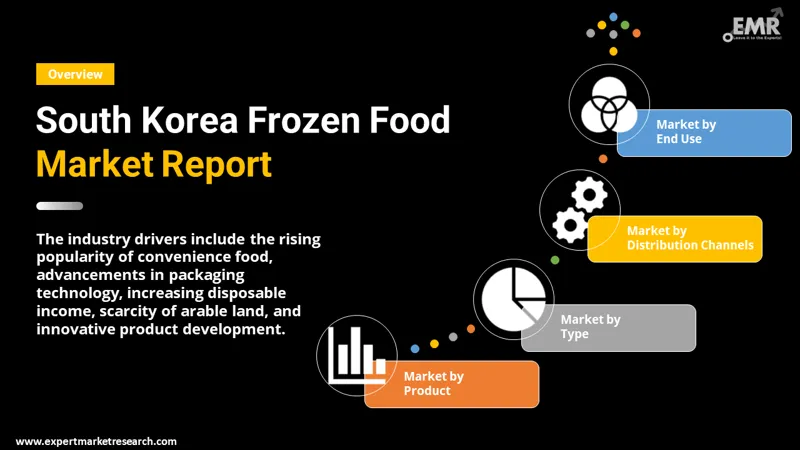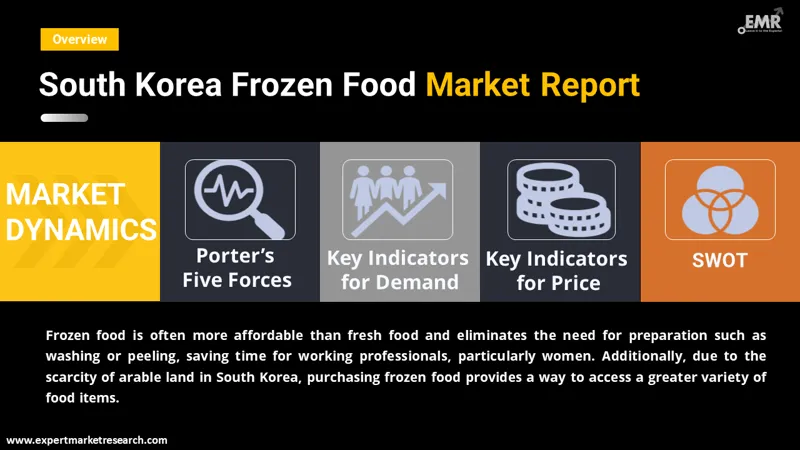
Consumer Insights
Uncover trends and behaviors shaping consumer choices today
Procurement Insights
Optimize your sourcing strategy with key market data
Industry Stats
Stay ahead with the latest trends and market analysis.
Base Year
Historical Year
Forecast Year






The South Korea Frozen Food market reached a value of about USD 2.07 billion in 2024. The industry is further expected to grow at a CAGR of about 6.7% in the forecast period of 2025-2034 to reach a value of around USD 3.71 billion by 2034.

Read more about this report - REQUEST FREE SAMPLE COPY IN PDF
Frozen foods are flash-frozen at a very low temperature to crystallise water and prevent the product from going soggy when thawed. This lowers the damage to the structure of food products. There is a very negligible variation in the nutrient content of the food. Hence, the food item stays fresh for a longer time. Moreover, Carotenoids and flavonoids are retained in frozen vegetables as they are often blanched before freezing. Frozen foods are widely accepted by people as it is a safe and healthy way of preserving food items, unlike canning and drying in which preservatives are added to increase the shelf life of products.
Frozen food is typically cheaper than fresh food and does not require any preparation like washing or peeling which saves a lot of time for working professionals, especially women. Also, arable land in South Korea is less hence buying frozen food is a way to make the variety of food items accessible.
Frozen food means any food item that has been processed, packaged or preserved that has been maintained at a temperature below the freezing point. Food will stay safe to eat for an infinite period of time at the suggested freezer temperature of 0 degrees Fahrenheit. Any bacteria, yeasts, and mould found in food are rendered inactive by freezing at this temperature.

Read more about this report - REQUEST FREE SAMPLE COPY IN PDF
By type, the frozen food market of South Korea can be segmented into:
By product, the South Korea frozen food market can be divided into:
Based on the end use, the South Korea frozen food market is classified into:
On the basis of distribution channel, the frozen food market of South Korea can be divided into:
The market for frozen foods is driven by increased demand for convenience brought on by an ageing population. Given that they take less time and effort to prepare than homemade meals, consumers' growing preference for convenience foods indirectly benefits the demand for frozen goods. These convenience foods are another temptation for those who are unable to hire a cook. These factors are contributing to the growth of the South Korea frozen food market.
To reduce the operational expenses, the food service industry like cafes, hotels, resorts, caterers, and restaurants are among the major consumers of frozen food products. Due to excellent internet penetration, companies are investing in online retail channels which are bolstering the growth of the frozen food market in South Korea. Online channels are expected to grow further during the given forecast period. Additionally buying Frozen food online is becoming a popular option among consumers as a result of the social distancing brought on by the COVID-19 pandemic.

Read more about this report - REQUEST FREE SAMPLE COPY IN PDF
Manufacturers make use of retort pouches , which can keep food fresh for around a year, and preservatives don't need to be added because of how the product is packaged. This guarantees that the product stays scrumptious and nutritious. Frozen meals are packed using techniques that preserve the quality and freshness of the components.
Rising disposable income, the development of goods with longer shelf lives, and an increase in impulsive buying have resulted in the growing demand for frozen food products. Given the benefits of frozen food and the strong backing for technological innovation, the items are now much more widely available and reasonably priced for people across the nation. The frozen food market has evolved from offering unprocessed raw food products such as frozen meat, vegetables, and fruits to prepared cuisine, frozen vegetable mixtures, bakery goods, and frozen desserts. The flavours, including sweetness, fat content, and texture, are the variables influencing the frozen food market's growth.
The report gives a detailed analysis of the following key players in the South Korean frozen food market, covering their competitive landscape, capacity, and latest developments like mergers, acquisitions, and investments, expansions of capacity, and plant turnarounds:
The comprehensive EMR report provides an in-depth evaluation of the market based on the Porter's five forces model along with a SWOT analysis.
| REPORT FEATURES | DETAILS |
| Base Year | 2023 |
| Historical Period | 2018-2024 |
| Forecast Period | 2025-2034 |
| Scope of the Report |
Historical and Forecast Trends, Industry Drivers and Constraints, Historical and Forecast Market Analysis by Segment:
|
| Breakup by Type |
|
| Breakup by Products |
|
| Breakup by End Use |
|
| Breakup by Distribution Channels |
|
| Market Dynamics |
|
| Competitive Landscape |
|
| Companies Covered |
|
*While we strive to always give you current and accurate information, the numbers depicted on the website are indicative and may differ from the actual numbers in the main report. At Expert Market Research, we aim to bring you the latest insights and trends in the market. Using our analyses and forecasts, stakeholders can understand the market dynamics, navigate challenges, and capitalize on opportunities to make data-driven strategic decisions.*
Get in touch with us for a customized solution tailored to your unique requirements and save upto 35%!
In 2024, the South Korea frozen food market attained a value of nearly USD 2.07 billion.
The market is projected to grow at a CAGR of 6.7% between 2025 and 2034.
The market is estimated to witness a healthy growth in the forecast period of 2025-2034 to reach USD 3.71 billion by 2034.
The popularity of convenience food, improved packaging, rising disposable income, less availability of arable land, and product development are the industry drivers.
Busy lifestyles, awareness as well as acceptance of frozen foods and concern regarding healthy diet and fitness are the major trends.
The dominant type of frozen food in the industry are Frozen Meals, Frozen Seafood, Meat, and Poultry, Frozen Fruits and Vegetables, Frozen Potatoes, Frozen Soup, and Dairy Products, among others.
The distribution channel segment is led by supermarkets/hypermarkets, convenience stores, and online stores, among others.
Major players in the South Korea frozen food industry are CJ CheilJedang Corp., Nongshim Co.,Ltd., Dr.Chung’s Food Co.,Ltd, SPC GFS CO. LTD, Daesang Corporation, Taejong FD Co., Ltd. and Others.
Datasheet
One User
USD 2,499
USD 2,249
tax inclusive*
Single User License
One User
USD 3,999
USD 3,599
tax inclusive*
Five User License
Five User
USD 4,999
USD 4,249
tax inclusive*
Corporate License
Unlimited Users
USD 5,999
USD 5,099
tax inclusive*
*Please note that the prices mentioned below are starting prices for each bundle type. Kindly contact our team for further details.*
Flash Bundle
Small Business Bundle
Growth Bundle
Enterprise Bundle
*Please note that the prices mentioned below are starting prices for each bundle type. Kindly contact our team for further details.*
Flash Bundle
Number of Reports: 3
20%
tax inclusive*
Small Business Bundle
Number of Reports: 5
25%
tax inclusive*
Growth Bundle
Number of Reports: 8
30%
tax inclusive*
Enterprise Bundle
Number of Reports: 10
35%
tax inclusive*
How To Order
Our step-by-step guide will help you select, purchase, and access your reports swiftly, ensuring you get the information that drives your decisions, right when you need it.

Select License Type
Choose the right license for your needs and access rights.

Click on ‘Buy Now’
Add the report to your cart with one click and proceed to register.

Select Mode of Payment
Choose a payment option for a secure checkout. You will be redirected accordingly.
Gain insights to stay ahead and seize opportunities.

Get insights & trends for a competitive edge.

Track prices with detailed trend reports.

Analyse trade data for supply chain insights.

Leverage cost reports for smart savings

Enhance supply chain with partnerships.

Connect For More Information
Our expert team of analysts will offer full support and resolve any queries regarding the report, before and after the purchase.
Our expert team of analysts will offer full support and resolve any queries regarding the report, before and after the purchase.
We employ meticulous research methods, blending advanced analytics and expert insights to deliver accurate, actionable industry intelligence, staying ahead of competitors.
Our skilled analysts offer unparalleled competitive advantage with detailed insights on current and emerging markets, ensuring your strategic edge.
We offer an in-depth yet simplified presentation of industry insights and analysis to meet your specific requirements effectively.



Australia
63 Fiona Drive, Tamworth, NSW
+61-448-061-727
India
C130 Sector 2 Noida, Uttar Pradesh 201301
+91-723-689-1189
Philippines
40th Floor, PBCom Tower, 6795 Ayala Avenue Cor V.A Rufino St. Makati City,1226.
+63-287-899-028, +63-967-048-3306
United Kingdom
6 Gardner Place, Becketts Close, Feltham TW14 0BX, Greater London
+44-753-713-2163
United States
30 North Gould Street, Sheridan, WY 82801
+1-415-325-5166
Vietnam
193/26/4 St.no.6, Ward Binh Hung Hoa, Binh Tan District, Ho Chi Minh City
+84-865-399-124
United States (Head Office)
30 North Gould Street, Sheridan, WY 82801
+1-415-325-5166
Australia
63 Fiona Drive, Tamworth, NSW
+61-448-061-727
India
C130 Sector 2 Noida, Uttar Pradesh 201301
+91-723-689-1189
Philippines
40th Floor, PBCom Tower, 6795 Ayala Avenue Cor V.A Rufino St. Makati City, 1226.
+63-287-899-028, +63-967-048-3306
United Kingdom
6 Gardner Place, Becketts Close, Feltham TW14 0BX, Greater London
+44-753-713-2163
Vietnam
193/26/4 St.no.6, Ward Binh Hung Hoa, Binh Tan District, Ho Chi Minh City
+84-865-399-124
Share